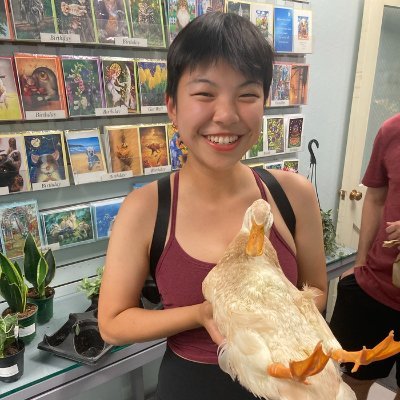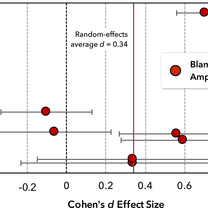
Pranav Khadpe
@PranavKhadpe
Followers
744
Following
2K
Media
19
Statuses
157
Human-Computer Interaction researcher | Senior Applied Scientist @Microsoft
Seattle, WA
Joined May 2017
Am *I* being crazy? Nope. Never. You're crazy.
AI always calling your ideas “fantastic” can feel inauthentic, but what are sycophancy’s deeper harms? We find that in the common use case of seeking AI advice on interpersonal situations—specifically conflicts—sycophancy makes people feel more right & less willing to apologize.
0
5
10
Thoughtful NPR article about biases in ChatGPT relationship advice! Thanks for mentioning our sycophancy research @emmabowmans :)
1
3
16
As of today, I am an Assistant Teaching Professor in the Entertainment Technology Center, an oddball department here at CMU! I can’t really find the words to express my excitement and gratitude. I'm so happy to have found this non-traditional academic role that fits me so well :)
14
7
200
Vedant is starting a new lab! Definitely should be on your radar if you like human-centered ML, wellbeing interventions, or beverage-inspired backronyms ☕!
🚀 I'm joining @nyuniversity as an Assistant Prof. + looking for PhD students in Human-Centered Technology, Innovation & Design! https://t.co/tDVQZqz41N
#AcademicTwitter [1/4]
1
0
5
I've long believed (but lacked evidence) that online communities are like gyms for our civic muscles: with thoughtful design, they can be spaces where we regularly work out our capacity to speak up/listen/respect differences/organize. Now @marianneaubin & @skairam have evidence!
TL;DR: City subreddits aren't just chatrooms -- they're digital infrastructure for crafting local belonging and civic participation. If you're interested in how the offline and online contribute together to shape local communities, I hope you enjoy: https://t.co/0jqeC80Gq6
1
1
17
[Please Repost] 🚀 Super excited to join @UVA CS as an Asst. Prof. this Fall! My lab focuses on AI + everyday tech = mental health innovation. Hiring PhD students who want to build technology that truly supports human wellbeing. Please see for more info:
subigya.me
My research sits at the intersection of AI, digital health, and human-computer interaction. I develop AI systems that use data from everyday technologies such as smartphone and wearables to underst...
15
22
134
It was a dream come true to teach the course I wish existed at the start of my PhD. We built up the algorithmic foundations of modern-day RL, imitation learning, and RLHF, going deeper than the usual "grab bag of tricks". All 25 lectures + 150 pages of notes are now public! 🧵
8
92
707
Quick essay about a rabbit hole I recently went down that culminated in me making a Wikipedia edit: https://t.co/Rv6qu6tDAl It's a journey through the writing of @bjnovak, Douglas Adams, and Jorge Luis Borges that ultimately reveals the genius of B.J. Novak.
5
1
12
Neat new way to think about LLM Sycophancy that draws on Goffman's analysis of face. Here are some insights formatted as a nutrition label for...LLM glazing!
Dear ChatGPT, Am I the Asshole? While Reddit users might say yes, your favorite LLM probably won’t. We present Social Sycophancy: a new way to understand and measure sycophancy as how LLMs overly preserve users' self-image.
1
3
20
I've been quiet for a while on the social media front -- it's been a very busy two years with an international move and setting up a new lab at KAIST, but I wanted to take a moment to highlight some of my students' fantastic new work in the domain of online safety.
1
10
65
✨How can we help communities collaboratively shape policies that impact them? In our #CHI2025 paper, we present PolicyCraft, a system that supports collaborative policy design through case-grounded deliberation. (🧵/11)
2
13
61
Do you work with text data for your job or research? We’d love to talk to you! We're running a paid user study at CMU to understand how people explore and visualize text data while programming—and to gather feedback on our new open-source visualization tool. Details below 👇
3
10
12
What next? We're working on a CMU-wide deployment of the extension. CMU spread the smiley so I think we've always been big on communicating delight :-)
1
0
1
Finally, who has claim to the appreciation when the work is collaborative? Contributors’ reactions were influenced by how much they felt they had contributed to the package that was thanked.
1
0
0
Hug Reports were also viewed as a valuable metric of use (ofc value determined by adoption). Today, contributors have little visibility into how their packages are used beyond download numbers. Insights into usage are valuable for raising funding and for project decisions.
1
0
1
But it is hard to be specific when praising. Contributors ofc preferred notes that were more specific but users often didn't know what to say beyond "this is great". Newer version includes scaffolding for users. For why praise is less differentiated see https://t.co/lQ4OJWlDZJ
journals.plos.org
Despite extensive recent investigations of moral judgments, little is known about how negative judgments like blame might differ from positive judgments like praise. Drawing on theory from both...
1
0
1
Overall, contributors were surprised and happy to receive the Hug Reports. In our field study, 18 users interacted with the extension for 3 weeks, resulting in messages of appreciation to 550 contributors, 26 of whom participated in subsequent research.
1
0
1
The extension builds on learnings from our field study of a more rudimentary version. We wanted to get a quick sense of how developers and users feel when sending Hug Reports. Read about it in our #CSCW2025 paper: https://t.co/ghhL6sv0nJ Some highlights below.
1
0
1










